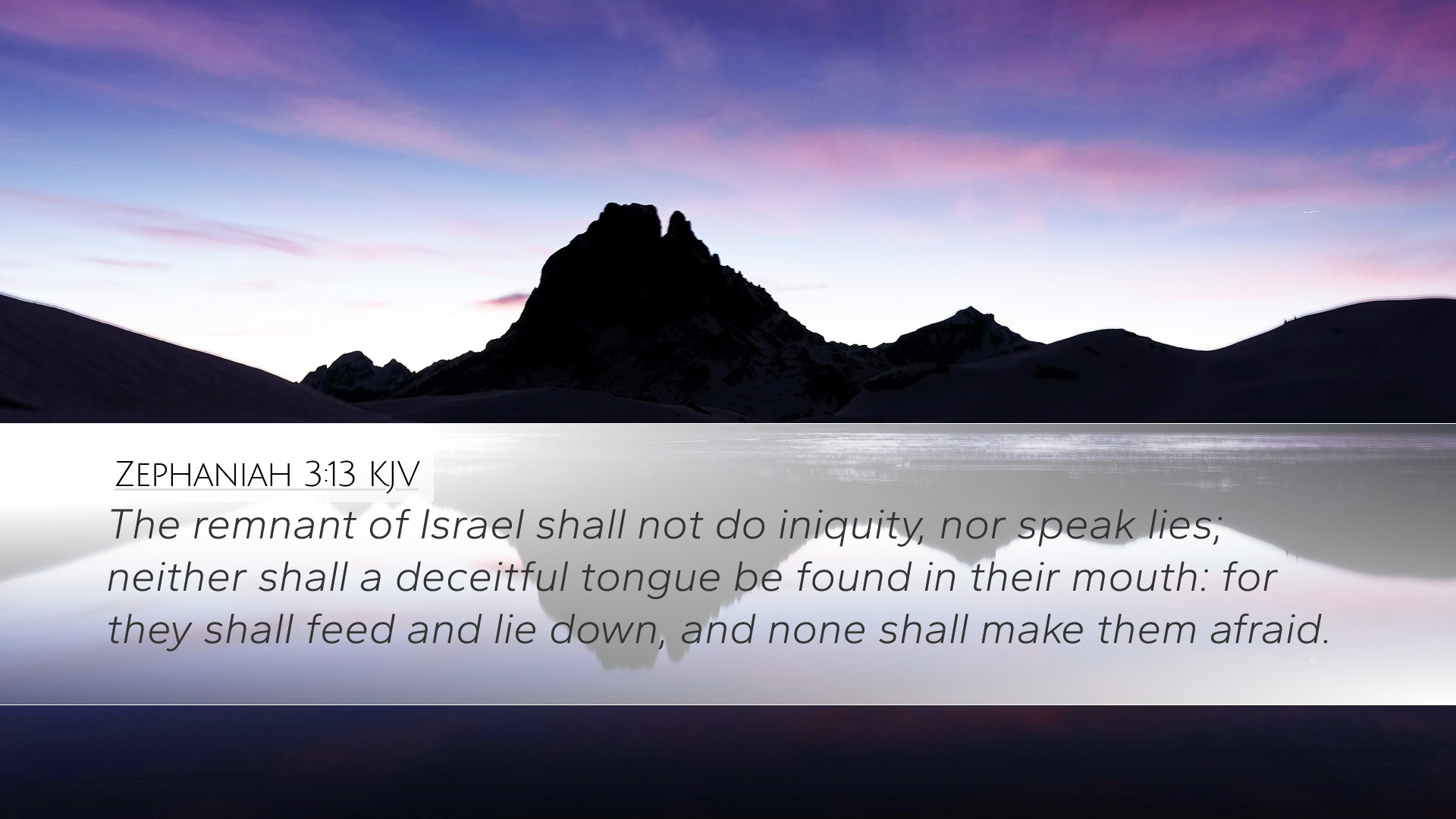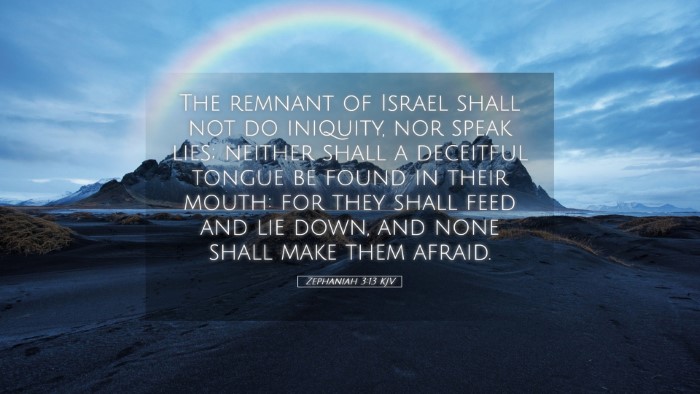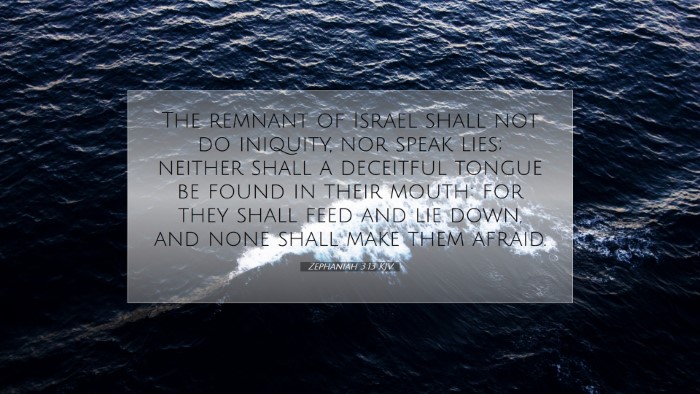Old Testament
Genesis Exodus Leviticus Numbers Deuteronomy Joshua Judges Ruth 1 Samuel 2 Samuel 1 Kings 2 Kings 1 Chronicles 2 Chronicles Ezra Nehemiah Esther Job Psalms Proverbs Ecclesiastes Song of Solomon Isaiah Jeremiah Lamentations Ezekiel Daniel Hosea Joel Amos Obadiah Jonah Micah Nahum Habakkuk Zephaniah Haggai Zechariah MalachiZephaniah 3:13
Zephaniah 3:13 KJV
The remnant of Israel shall not do iniquity, nor speak lies; neither shall a deceitful tongue be found in their mouth: for they shall feed and lie down, and none shall make them afraid.
Zephaniah 3:13 Bible Commentary
Commentary on Zephaniah 3:13
Verse Text: "The remnant of Israel shall not do iniquity, nor speak lies; neither shall a deceitful tongue be found in their mouth: for they shall feed and lie down, and none shall make them afraid."
Introduction
In this verse, Zephaniah presents a vision of hope for a remnant of Israel, one that is purified and characterized by righteousness. This passage highlights the transformative power of God's grace and the promised restoration of His people. For pastors, theologians, and scholars, understanding this verse involves exploring the implications of remnant theology, the nature of divine restoration, and the ultimate fulfillment in the character of God’s people.
General Insights from Commentaries
Several key themes emerge from public domain commentaries on Zephaniah 3:13, particularly regarding the remnant, their conduct, and the peace promised by God.
1. The Remnant of Israel
The concept of a remnant is significant throughout the prophetic literature. Matthew Henry notes that this remnant symbolizes a faithful group within Israel who partake in the mercy and grace of God. This remnant is not defined by social status or ethnicity but by their relationship with God, highlighting His sovereignty in preserving a people for Himself.
2. Conduct of the Righteous
Albert Barnes emphasizes the ethical and moral transformation of the remnant. In this restored community, there is an absence of iniquity and falsehood. This change in behavior serves as both a reflection and a requirement of the redemption they receive. The remnant's ability to live according to God's commandments demonstrates the internal work of the Spirit as they embrace truth and righteousness.
3. The Promise of Peace
Adam Clarke articulates the profound peace that comes upon this remnant, noting that they will "feed and lie down". This metaphor suggests a return to security and rest, contrasting the tumultuous history leading to this prophetic promise. The assurance that "none shall make them afraid" indicates a reversal of their former fears and oppressions, pointing to the millennial fulfillment of peace found ultimately in Christ.
Theological Implications
The verse embodies rich theological implications relevant to contemporary faith communities. It encourages reflection on the nature of God's promise and the condition of His people.
1. Restoration and Redemption
Thematically, Zephaniah’s proclamation is one of hope. The idea that a remnant will emerge untainted by sin (in contrast to the idolatry endemic to Israel at that time) speaks to the broader narrative of restoration that resonates through Scripture—from the Exodus to the New Testament fulfillment in Christ. Here, the redemptive work of God is not merely about sparing but rather transforming.
2. Ethical Living
In light of this passage, pastors and theologians can explore the implications of ethical living in today's context. The call to avoid sin and deception remains relevant, encouraging congregations to examine their lives against the backdrop of divine holiness. The challenge posed by the text demands a faith that expresses itself in works of righteousness.
3. Assurance of Security
The security promised to the remnant serves as a comforting assurance for believers. In today's world, filled with anxieties and fears, the notion that one finds peace in God’s presence is paramount. The metaphor of lying down without fear underscores the complete restoration to fellowship with God, which is a hallmark of biblical shalom—the peace that covers all aspects of life.
Application for Present-Day Believers
As we meditate on Zephaniah 3:13, several applications can be drawn for contemporary believers:
- Personal Reflection: Believers are encouraged to assess their own lives in light of this passage, seeking to reflect the character of the remnant through a commitment to truth and integrity.
- Community Engagement: Churches can work towards fostering environments where honesty prevails, encouraging accountability and transparency among members.
- Evangelistic Witness: The transformative story of redemption is a compelling narrative for witnessing. The Church is called to represent this hope to a world that is often characterized by fear and deception.
- Restoration Ministries: Zephaniah’s message prompts the Church to engage in social justice and restoration efforts as a reflection of God’s heart for the lost and the broken.
Conclusion
In Zephaniah 3:13, we encounter a promise of hope and the assurance of God’s faithful love toward His people. The remnant described is marked by righteousness and peace, serving as a model for today’s believers in seeking holiness and community. Through the insights provided by esteemed biblical commentators, this passage encourages a vigorous faith that remains steadfast in the promises of God, even amidst trials.


